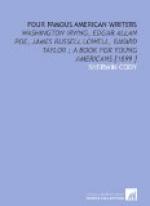“There is not even a tradition of any one’s ever having turned the wary Deacon’s flank,” says
Lowell, “and his Laodicean apples persisted to the end, neither one thing nor another.”
It did not take young Lowell long to find out that he had a weakness for poetry (as his seniors sometimes spoke of it). Writing to his friend Loring, probably at the beginning of the Christmas vacation, 1836, he says, “Here I am alone in Bob’s room with a blazing fire, in an atmosphere of ‘poesy’ and soft coal smoke. Pope, Dante, a few of the older English poets, Byron, and last, not least, some of my own compositions, lie around me. Mark my modesty. I don’t put myself in the same line with the rest, you see.... Been quite ‘grouty’ all the vacation, ‘black as Erebus.’ Discovered two points of very striking resemblance between myself and Lord Byron; and if you will put me in mind of it, I will propound next term, or in some other letter, ‘Vanity, thy name is Lowell!’”
And again, in a letter to his mother, he says, “I am engaged in several poetic effusions, one of which I dedicated to you, who have always been the patron and encourager of my youthful muse. If you wish to see me as much as I do you, I shall be satisfied.”
This is Mrs. Lowell’s answer to the last wish. She and Dr. Lowell were then making a visit to Europe: “Babie Jamie: Your poetry was very pleasing to me, and I am glad to have a letter, but not to remind me of you, for you are seldom long out of my head.... Don’t leave your whistling, which used to cheer me so much. I frequently listen to it here, though far from you.” In later years Lowell would often tell how he used to whistle as he came near home from school, in order to let his mother know he was coming, and she seldom failed to be sitting at her window to welcome him.
Early in 1837 Lowell was elected to the Hasty Pudding Club. “At the very first meeting I attended,” he writes to his friend, Shackford, “I was chosen secretary, which is considered the most honorable office in the club, as the records are kept in verse (mind, I do not say poetry). This first brought my rhyming powers into notice, and since that I have been chosen to deliver the next anniversary poem by a vote of twenty out of twenty-four.”
Not long afterward he writes to his friend Loring, “I have written about a hundred lines of my poem (?), and I suspect it is going to be pretty good. At least, some parts of it will take.” And after a few lines he goes on, “I am as busy as a bee—almost. I study and read and write all the time.” A little later he writes a letter to Loring in Scotch dialect verse.
This was not the sort of work, however, that the college authorities expected of him. He was lazy and got behind his classes, so that near the end of his course he was rusticated, or suspended from college for some weeks. He had been chosen class poet, but on account of his suspension he could not read his poem, though it was printed.




